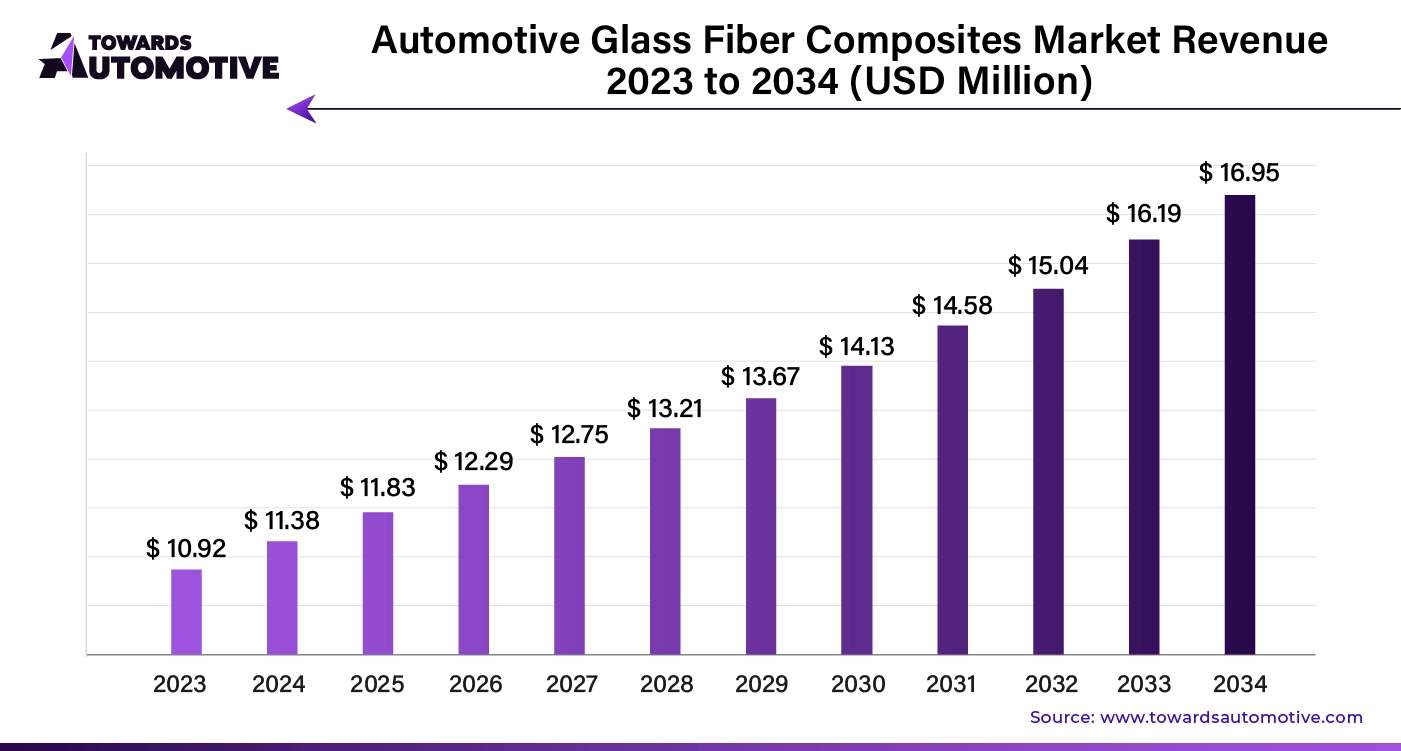Artificial Intelligence (AI) is reshaping industries across the globe, and the automotive sector is no exception. In particular, AI is playing a transformative role in the automotive glass fiber composites market, enhancing production processes, improving material properties, and optimizing design efficiency. The ability to analyze large amounts of data, simulate designs, and improve manufacturing processes is revolutionizing how automotive components are developed and produced.
The global automotive glass fiber composites market is estimated to be valued at USD 11.38 billion in 2024 and is projected to reach USD 16.95 billion by 2034, growing at a compound annual growth rate (CAGR) of 4.65% from 2024 to 2034. This growth reflects the increasing demand for lighter, stronger, and more durable materials in the automotive industry, which is being further accelerated by the adoption of AI technologies.

Get All the Details in Our Solution – Download Brochure @ https://www.towardsautomotive.com/download-brochure/1025
Enhancing Production Processes
One of the key contributions of AI in the automotive glass fiber composites market is its ability to analyze vast datasets related to material performance, manufacturing processes, and environmental factors. AI algorithms can predict potential issues in production and product performance before they occur, enabling manufacturers to take proactive measures to ensure the quality of their products. This predictive capability helps to reduce waste, improve efficiency, and maintain high production standards.
AI-driven systems can monitor production processes in real-time, using machine learning to identify defects and inconsistencies in composite materials. By leveraging advanced technologies like computer vision and sensor data, manufacturers can maintain tight quality control, ensuring that every automotive component meets stringent performance and durability standards.
Optimizing Design Efficiency
Designing automotive components using glass fiber composites requires balancing strength, weight, and cost. AI tools are proving invaluable in this area by simulating and modeling different configurations and materials. These AI-driven tools help engineers identify the most effective designs, resulting in faster product development cycles. By leveraging AI, manufacturers can explore a wider range of design possibilities and refine their components to achieve the best possible outcomes.
The AI-powered design process allows for more precise and accurate development of glass fiber composite components. Engineers can create optimized designs that meet specific performance, weight, and cost targets without the need for physical prototypes. This not only accelerates the design phase but also contributes to the overall efficiency of the product development lifecycle.
Improving Supply Chain Efficiency
AI technologies are also enhancing the supply chain within the automotive glass fiber composites market. Predictive algorithms can forecast demand fluctuations and optimize inventory levels, ensuring that materials are available when needed to maintain production schedules. The automotive industry, which operates under tight timelines and requires a constant supply of materials, greatly benefits from AI-driven supply chain optimization.
Moreover, AI enables manufacturers to respond to market trends and consumer preferences by providing insights that inform customized solutions. As consumer demand for more tailored automotive components rises, AI allows manufacturers to develop glass fiber composites that meet specific performance or aesthetic requirements, further driving innovation in the industry.
Fostering Sustainability
Sustainability is an increasingly important priority for the automotive industry, and AI is helping to make the production of glass fiber composites more environmentally friendly. By optimizing resource use, minimizing waste, and improving recycling processes, AI supports the industry’s goal of reducing its environmental impact. AI systems can identify inefficiencies in manufacturing and suggest sustainable alternatives, helping companies align with the broader goal of producing more eco-friendly products.
Additionally, AI tools can help manufacturers develop more sustainable glass fiber composites, ensuring that the production processes not only meet performance standards but also adhere to sustainability guidelines.
A New Era with AI-Based Tools
A prime example of the integration of AI in automotive glass fiber composite production is the launch of Plyable’s AI-based tool in February 2024. This tool, specifically designed for molding glass fibers used in automotive applications, is set to revolutionize how glass fiber components are produced. By utilizing AI to optimize molding processes, Plyable’s innovation is expected to improve efficiency and product quality while reducing waste and energy consumption.
Invest in Our Premium Strategic Solution @ https://www.towardsautomotive.com/price/1025
You can place an order or ask any questions, please feel free to contact us at sales@towardsautomotive.com
Explore the comprehensive statistics and insights on automotive industry data and its associated segmentation: Get a Subscription
For Latest Update Follow Us: https://www.linkedin.com/company/towards-automotive
